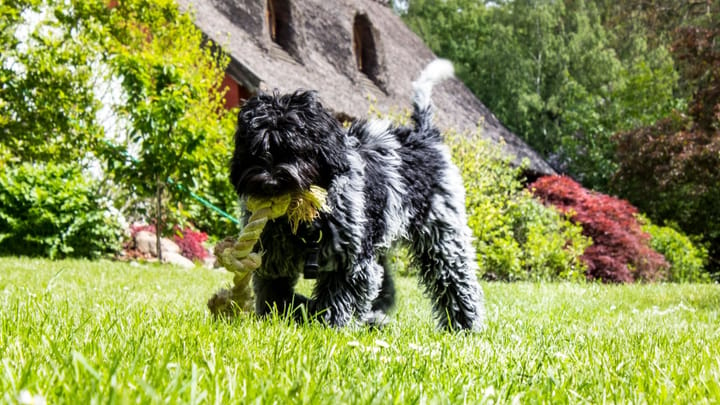Dutch Schapendoes
Other names : Schapendoes, Dutch Sheepdog


The Schapendoes is a long-haired, shaggy working breed of dog native to the Netherlands. This is a dog with high energy and a smart, alert, mind - it requires an owner who can keep up with these impressive physical and mental abilities. With that said, its kind, loyal and cheerful nature makes it a wonderful family companion.
|
Life expectancy |
The Dutch Schapendoes has a life expectancy of between 12 and 14 years |
|
Temperament |
|
|
Size |
Medium
|
|
Adult size |
Female
Between 16 and 19 in
Male
Between 17 and 20 in
|
|
Adult weight |
Female
Between 22 and 40 lb
Male
Between 22 and 40 lb
|
|
Coat colour
Most commonly black and/or white, but also seen in brown and gray. |
Black White Brown Blue Red Sand |
|
Type of coat
Long shaggy and thick, with a good undercoat. |
Long Wavy |
|
Eye colour
Brown. |
Brown
|
Schapendoes were almost wiped out during WWII, but were saved thanks to a small group of dedicated breeders.
More details about the Dutch Schapendoes
Dutch Schapendoes: Origins and history
The lovely Schapendoes breed originates from Holland and was a highly capable farm and herding dog there. It wasn’t recognized by the Dutch Raad van Beheer (the national kennel club) until 1952. After almost facing extinction, this breed is still endangered today and is extremely rare in the UK.
Physical characteristics of the Dutch Schapendoes
The Schapendoes is a medium-sized dog with a striking long, shaggy coat and adorable moustache. The ears are high-set, small and completely covered in fur, while the eyes are large with a frank, loyal, and lively expression. The body is athletic and agile; longer than it is tall.
FCI classification of the Dutch Schapendoes
-
Group 1 - Sheepdogs and Cattledogs (except Swiss Cattledogs)
-
Section 1 : Sheepdogs
Dutch Schapendoes: Characteristics
Dutch Schapendoes: Behaviour
Training a Dutch Schapendoes
The Schapendoes, despite having an independent and stubborn streak, is very eager to please. While he will definitely require firm and consistent training, he is more than capable of picking up new commands and tricks easily.
Dutch Schapendoes: Lifestyle
Breed compatibility Dutch Schapendoes
Dutch Schapendoes: Purchase price
We do not have enough data to set an average price for purchase. However, looking after a dog of this size typically costs between £60 to £90 a month, including food, medical/insurance, and incidental expenses.
Dutch Schapendoes: Shedding
Average
Low to medium shedding - regular grooming will help.
Dutch Schapendoes: Grooming
The Schapendoes’ stunning shaggy coat requires brushing 1-2 times per week. This breed should be bathed occasionally and only when necessary, as too many baths may dry out the skin. The Schapendoes’s nails grow rapidly and need trimming regularly. Check the ears every week and clean if necessary to avoid wax and debris build-up. Brush the teeth as often as you can - ideally every day.
Dutch Schapendoes: Health
The Schaependoes is generally a hardy breed but is highly prone to a serious eye condition. It's life expectancy is 13 years.
Overall, this is a robust and healthy breed.
The Schapendoes isn’t afraid of high temperatures.
The Schapendoes is bred to herd sheep in cold and wet weather conditions, with a thick, protective, insulating coat to keep it warm.
An active Schapendoes is unlikely to gain excess weight. However, sometimes this breed has eyes bigger than its stomach - measure out food allowances daily.
- Progressive Retinal Atrophy
- Cataracts
- Hip & elbow dysplasia
- Ear infections







